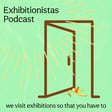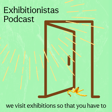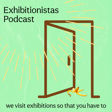
The Exhibitionistas Origin Story!
If this was a Friends episode, we would have titled it "The One Where Emily and Joana ask Each Other Questions". But it's not, so we decided to describe it as an origin story: we go back to the reasons why we decided to do this podcast and why it has such a distinctive format: an arts specialist and an exhibition goer candidly discussing solo exhibitions.
This intro is a way to ease into this new and promising second season, and to (re)introduce the podcast to our listeners. It's always good to go over the rules of the game. Believe me, you will be reminded that this is a feelings, research and thoughts podcast. (And if you think these don't go together, think again!)
Asking each other questions has allowed us to reveal to each other a few things we hadn't discussed, busy, as we were, with actually producing the episodes. There are a few revelations in there, self-explorations and we realise what the podcast brought us, and, by extension, our listeners. Or so we hope!
Music: Saturn.
Instagram: exhibitionistas_podcast.


